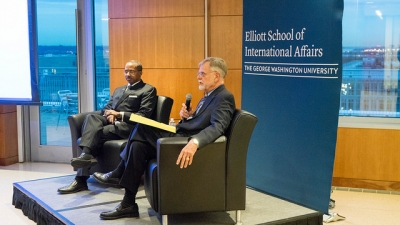Elliott School professors, along with the faculty from other GW schools and centers, have been in high demand for media commentary on the Trump Administration’s actions since the President’s inauguration.
The average number of media requests per week for the Elliott School alone rose from 22 to 33 from mid-January to mid-February, 2017, compared with the same time period in 2016. Those faculty members whose research touches on Trump’s priority issues -- such as US relations with Russia and China, immigration and immigrants, the United Nations, and Islamic terrorism -- received the most requests for interviews.
During the week covering the departure of Michael Flynn as National Security Advisor and the appointment of General H.R. McMaster as his replacement, Elliott School faculty received more than 50 requests for comments on this topic alone. Many remarks quoted in one publication were picked up by syndicated newspapers. For example, Professor Stephen Biddle’s reaction to Trump’s selection of General McMaster, originally published in the Associated Press subsequently ran in 35 additional media outlets:
"He [McMaster] is very forceful in stating what he believes and had managed to ruffle quite a few feathers in the process….Will a guy who is willing to speak truth to power, and do so in a forceful way, be able to be effective in this setting?"
Another trend indicative of the level of interest in expert analysis generated by the Trump presidency are the number of foreign outlets picking up on stories and quoting Elliott School faculty. English language newspapers around the world, including the Sydney Morning Herald, The Times of India, Singapore’s The Straits Times, The Bangkok Post, and The Korea Times, have all quoted Elliott faculty over the past two months.
No topic received more attention than the executive order banning travel from seven predominately Muslim countries. Elliott School Professor Marc Lynch wrote an analysis of universities’ collective reaction to the executive order for the “Monkey Cage,” a political science blog published by The Washington Post. Here is a summary of his findings:
Universities overwhelmingly objected to the Trump travel ban. Nearly every college and university in the country released a statement in response to the executive order.
The values articulated in the statements were remarkably similar across the partisan divide. Institutions in states that trend both Republican and Democratic tended to emphasize a similar focus on the need for diverse and inclusive communities and to highlight the importance of contributions by international scholars.
Words that appeared most frequently across every statement included: community, diverse, welcoming, inclusive, safe, protect, and global.
Lynch is reassured by the consistency, breadth, and depth of support by colleagues around the country for their international students and faculty. He notes, “Most leaders of institutions of higher education seem willing to fight not only to protect their students and faculty, but to speak out in defense of inclusion, toleration, diversity, and community.”
For a weekly digest of Faculty in the News, sign up for the Elliott School events newsletter.


